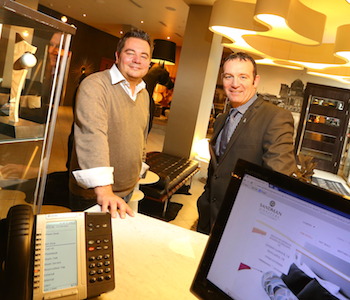 Whether supplying cloud, on-premise PBX or a mixture of both, the future of business communications should be based on a multi-channel approach, providing choice, flexibility and placing full control and value into the hands of customers.
Whether supplying cloud, on-premise PBX or a mixture of both, the future of business communications should be based on a multi-channel approach, providing choice, flexibility and placing full control and value into the hands of customers.
Multi-channel adoption and integration with information systems are two of today's big trends, a turn of events that Content Guru predicted some time ago when it adopted its storm communications integration positioning. "Multi-channel has moved from being an ambition of end users to a necessity," said Content Guru Managing Director Sean Taylor (pictured). "Without it, web chat, email and social media will grow out of control in their separate silos. Anticipating customer needs and personalising service experiences is another key area. That applies as much to delivering personalised online web experiences as it does to live agent contact centre interactions."
With most companies now running one or more core IT systems providing CRM, WFM, ERP and other TLAs, the ability to connect properly between corporate communications and these packages, many of which are cloud-based, is becoming a compelling call to action for customers and a 'massive' opportunity for resellers, believes Taylor, who also says that empowering the consumer is a key driver behind Content Guru's strategy.
"When customers make contact with an organisation they want choice in terms of how, when and where they make contact - and they want control," he stated. "If our clients can't provide that control their consumers will simply look for a competitor who can. Enabling omni-channel, or integrated multi-channel, communications is critical to helping companies deliver excellent and consistent service quality across every device consumers use to interact."
The UC technology space is not only competitive, but also increasingly convoluted. End users are faced with a bewildering array of products and services with many claiming to do the same job, and the terminology and acronyms used often exacerbate matters. "It's our role as a service provider to cut through the jargon and make life as simple as possible for our channel partners," added Taylor. "It's not just a question of having clear pricing plans, brochures and documentation, it's also about building propositions that deliver a clear value to clients. The future will be less about product and service selling and more about solution selling where the value to clients is clear in terms of pounds and pence."
But the one thing Taylor wants to change at a stroke is to make it easier, quicker and more transparent to order and receive data circuits to the customer location. "We have put a great deal of design and effort into making our reseller portal simple and intuitive to use, but the circuit side is still a realm of mystery and darkness, where the reseller must navigate a perilous path through the unknown just to get a circuit delivered correctly to the customer," said Taylor.
Connectivity issues may be slowing down cloud adoption but Mark Colquhoun, CEO at Solar Communications, is nevertheless clear about the role cloud will play in the future of his business despite a number of niggling issues that are holding back the market. "The perceived barriers to adoption seen by our customers include concerns over the security of data stored in the cloud, the integration between cloud systems and traditional systems and the loss of control of the system itself," he said. "These factors are taken into consideration as we select vendor solutions and also specify and build our own cloud offers."
Solar Communications is offering customers the opportunity to leverage the cloud by taking the risk out of the transition. "Cloud doesn't have to mean rip and replace, and we can bring cloud in slowly in a controlled migration as they start to retire legacy servers," added Colquhoun. "With new estates there's also no reason why cloud can't be offered on a par with premise options. The most important point is to talk to customers about their needs rather than putting the product first, and focus on making an informed decision on whether public cloud, private hosted, on-premise or a blend will be better. Flexibility is key."
According to Colquhoun's observations of the CPE PBX market the cloud was more quickly adopted by smaller SMEs, largely because of the benefits it offers in terms of price and simplicity. Public cloud is now well established in that space and is beginning to make inroads into the larger end of the market. "We are also seeing greater interest from SME customers in private cloud solutions rather than public cloud as this can overcome some challenges," explained Colquhoun. "With public cloud you're tied into a feature set. However, with a private cloud you have flexibility and retain feature control and control of release/version adoption. Loss of control is a key concern for those looking at cloud solutions.
"It's also possible for cloud and on-premise PBXs to work together and we expect to see some interesting vendor announcements in this area that offer customers a low risk path to cloud adoption," added Colquhoun. "This addresses another major area of concern - the payback on investments already made in CPE."
Colquhoun is focused on making sure he selects and packages a range of cloud solutions that enable Solar to offer choice to its customers, enabling the company to provide a solution that fits their chosen approach to cloud. "The potential for delivering hybrid solutions provides an extra dimension that few providers will have," he added.
Colquhoun would like to see vendors demonstrating how the promised benefits of moving to cloud have actually been realised. "Many customers adopt on the basis of reducing the cost of acquiring and maintaining IT systems and services," he commented. "There is no doubt that the capital expense of traditional CPE PBX deals is removed by cloud, but customers still need convincing that shifting to opex models truly delivers cost savings over an extended timeframe."
Fundamentally, partners want choice, and not just day one choice but continued choice as to what and how they sell to their customers, according to Keith Bartlett, EMEA Director Business Development, Distribution and Inside Sales at ShoreTel. "Our product strategy offers partners this ongoing choice as to whether they sell premise, cloud or hybrid solutions to their customers," he stated. "As a result of this significant evolution in our platforms, consideration from large systems integrators and service providers globally has increased over the last year. We expect this to continue and gather pace."
ShoreTel's plan is to continue to grow and invest in its CPE business. "This is still, by far, the largest percentage of the market and likely to be the case for many years to come," added Bartlett. "However, while our product strategy delivers choice and flexibility for our channel partners and their customers, our cloud business will naturally grow too."
Bartlett has seen a marked difference between low end, sub-20 user cloud subscribers and those wanting a more robust, CPE-like solution that drives business change and delivers full featured UC rather than simplex telephony. "We are focusing on this area of the market where the value of UC to a business's change strategy is paramount and of higher perceived value," he said.
Bartlett also believes that some VARs are still selling on ARPU rather than value. "As the ARPU declines so does the margin per seat and subsequently the ability for a VAR to invest in the sales cycle," he added. "We have to educate the channel and end customers that buying a service in the cloud is the same as buying the same service as CPE."
Overall, there is healthy demand for on-site and off-site solutions observed Paul Burn, Head of Category Sales at Nimans, who advises resellers to have a foot in both camps. He also pointed out how in many circumstances cloud-based applications can work seamlessly alongside CPE hardware, such as call centre and call management reporting. "For us as a distributor, and also for our customers it's important to evolve," he commented.
"Market analysts say the PBX is threatened, but in the real world we are seeing good growth of CPE as well as hosted. Technology simply evolves, and it's important to give customers choice as part of a consultative approach. Perhaps one day hosted will be the overall winner, but in what time frame and what guise, who knows?"
 Gateshead-based IT firm Advantex Network Solutions has completed a five figure contract to supply superfast broadband services to a Newcastle hotel just 10 days after receiving the initial enquiry.
Gateshead-based IT firm Advantex Network Solutions has completed a five figure contract to supply superfast broadband services to a Newcastle hotel just 10 days after receiving the initial enquiry.
 Former Great Britain rower Sean Dixon has hung up his oars and is now pulling in sales alongside reseller partners at Henley-based service provider Fidelity Group.
Former Great Britain rower Sean Dixon has hung up his oars and is now pulling in sales alongside reseller partners at Henley-based service provider Fidelity Group. In his new role at youth led development agency Restless Development, Jim Sewell, former Sales and Marketing Director at Alternative Networks, hopes to recruit telecoms champions for an 'Entrepreneur Panel' to support fledgling enterprises in the developing world.
In his new role at youth led development agency Restless Development, Jim Sewell, former Sales and Marketing Director at Alternative Networks, hopes to recruit telecoms champions for an 'Entrepreneur Panel' to support fledgling enterprises in the developing world. Marston's PLC has long been known as one of the UK's largest independent pub retailing businesses and brewer, not so well know is its burgeoning telecoms business headed up by Operations Director Rob Derbyshire.
Marston's PLC has long been known as one of the UK's largest independent pub retailing businesses and brewer, not so well know is its burgeoning telecoms business headed up by Operations Director Rob Derbyshire. With election fever mounting service provider Channel Telecom has unveiled its own manifesto which calls upon the Government to rethink its approach to the telecoms sector.
With election fever mounting service provider Channel Telecom has unveiled its own manifesto which calls upon the Government to rethink its approach to the telecoms sector. Comms service provider Plan has unveiled an ambitious strategy to ramp up profits for its mobile reseller partners by adding a complete range of comms solutions to its portfolio.
Comms service provider Plan has unveiled an ambitious strategy to ramp up profits for its mobile reseller partners by adding a complete range of comms solutions to its portfolio. Whether supplying cloud, on-premise PBX or a mixture of both, the future of business communications should be based on a multi-channel approach, providing choice, flexibility and placing full control and value into the hands of customers.
Whether supplying cloud, on-premise PBX or a mixture of both, the future of business communications should be based on a multi-channel approach, providing choice, flexibility and placing full control and value into the hands of customers. When Voicenet Solutions was acquired by US giant 8x8 Inc in December 2013 for $18.4 million the UK-based cloud comms provider suddenly looked very different...
When Voicenet Solutions was acquired by US giant 8x8 Inc in December 2013 for $18.4 million the UK-based cloud comms provider suddenly looked very different... Darren Garland once patrolled the world's seas unnoticed but today he's plain sailing in the channel as Managing Director of highly visible distributor ProVu Communications.
Darren Garland once patrolled the world's seas unnoticed but today he's plain sailing in the channel as Managing Director of highly visible distributor ProVu Communications. By Elvire Gosnold, Director, Blabbermouth Marketing: We are all pressured to do more, especially when it comes to marketing - have a presence on more social networks, write more blog posts, send more emails, run more reports, capture more leads, generate more sales etc. Doing more works well most of the time. Blogging more, for example, can increase website traffic, improve brand awareness and generate leads. But other times, doing less can be a much better idea.
By Elvire Gosnold, Director, Blabbermouth Marketing: We are all pressured to do more, especially when it comes to marketing - have a presence on more social networks, write more blog posts, send more emails, run more reports, capture more leads, generate more sales etc. Doing more works well most of the time. Blogging more, for example, can increase website traffic, improve brand awareness and generate leads. But other times, doing less can be a much better idea.